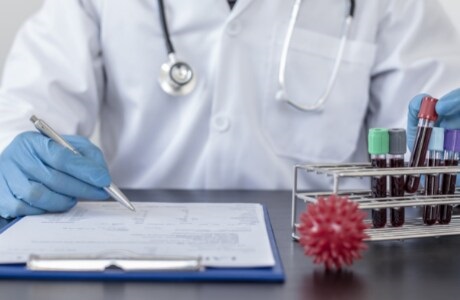By: Gregory Grant, DO, Fisher-Titus Family Medicine Milan
Most people have probably had blood drawn at some point in their lives. Blood tests analyze various components of your blood to detect physiological and chemical changes in the body. These blood tests can screen for certain medical problems, monitor the effectiveness of therapy for chronic medical conditions, and provide baseline information regarding organ function.
The frequency of testing differs for each person. Folks with chronic medical problems may need more frequent testing. Age certainly will play a role in how often you should get screening blood tests. Even if you are healthy, getting screening blood work regularly can help give your doctor a baseline so should something change in the future, they can compare results and detect subtle changes.
But what tests should you be getting? There are many different types of screening and diagnostic blood tests. Talk to your doctor at your annual physical about which tests they would recommend for you and the frequency you should have testing performed.
Fisher-Titus hosts several health screenings throughout the year where individuals can pay out of pocket for various blood tests at a reduced rate. For individuals who are uninsured or for those whose insurance may not cover these types of tests, this can be a more affordable option to get the testing they need.
The tests below are all offered at varying prices at all Fisher-Titus Community Health Screenings.
What are Different Types of Screening Blood Tests?
Complete Blood Count – The complete blood count acts as a quick snapshot of the overall health of your blood and bone marrow. It measures the number, variety, percentage, concentration, and quality of platelets, red blood cells, and white blood cells. It is useful in screening for infections, anemias, and other hematological abnormalities.
Basic Metabolic Panel – The basic metabolic panel measures glucose, blood urea nitrogen (BUN), creatinine, electrolytes, and calcium. This test can help determine whether your kidneys are functioning properly and helping you maintain the right balance of water, salts, and minerals in your blood.
Lipid Profile – The lipid profile provides your doctor with information on your cardiovascular health. This test measures cholesterol, triglycerides, HDL, and LDL.
Liver Enzymes – The liver enzymes tests can indicate if there is liver disease or damage. This test can also be used to monitor liver disease in a person who has a diagnosed problem. The test measures alanine transaminase (ALT) and aspartate transaminase (AST). ALT helps convert proteins into energy and AST helps metabolize amino acids. When the liver is damaged, these enzymes are released into the blood and elevated levels will show on the test.
Complete Blood Count, Basic Metabolic Panel, Lipid Profile, and Liver Enzymes are all part of the Blood Analysis test offered at Fisher-Titus Community Health Screenings.
There additional screening blood tests that can be added if your physician recommends them. These include:
PSA (Prostate Specific Antigen) – PSA is a protein found in men that is created in the prostate. A PSA test checks the level of this protein. Elevated levels can indicate if a person has an enlarged prostate, prostate inflammation, or prostate cancer.
Hemoglobin A1c – A Hemoglobin A1C test is one of the best ways to assess glucose status. The test measures your blood sugar over the past few months. The results can help your doctor diagnose prediabetes and diabetes and is also used to help manage diabetes in patients who have been previously diagnosed.
TSH (Thyroid) – Thyroid Stimulating Hormone (TSH) controls thyroid hormone secretion. It is a snapshot of thyroid function at that time. If levels from this test are lower than normal, it can suggest the thyroid is overactive(hyperthyroidism). If levels are above normal, it can suggest the thyroid is underactive(hypothyroidism). Symptoms of thyroid imbalance are many and can be subtle. Some individuals may not even have any symptoms. A TSH blood test can help your doctor diagnose mild thyroid imbalance before it progresses and becomes a larger problem.
Vitamin D – Having inadequate levels of vitamin D in the blood is a very common issue. Vitamin D deficiency can be linked to osteoporosis, increased fracture risk, cancer, autoimmune dysfunction, cardiovascular disease, multiple sclerosis, lowered immunity to colds and flu, type 1 diabetes and hypertension. By regularly checking your Vitamin D levels, your doctor can determine if you have a Vitamin D deficiency and can help you determine the appropriate steps to correct it.
The next Fisher-Titus health screening will be held on February 26 as part of the Heart Fair & Winter Community Health Screening at the Snyder/White Heart & Vascular Center at Fisher-Titus. Pre-registration is required by calling 419-660-2646.
